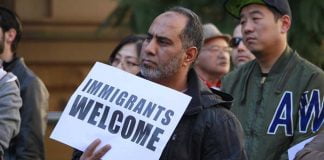The suicide death of Fijian asylum seeker Josefa Raulini on September 20 triggered a wave of protest inside Villawood detention centre.It pushed the horrible consequences of mandatory detention and offshore processing onto the mainstream political agenda.
Josefa’s death had a dramatic and traumatic effect inside Villawood.
Tamil asylum seekers in the adjoining compound held a moving solidarity protest for Josefa, tearing black garbage bags, waving them above their heads and tying them to the wire fence surrounding the compound.
Hours after witnessing Josefa jump, nine Tamils, an Iranian and an Iraqi asylum seeker staged a roof top action in protest at their long detention and the threat of deportation.
“We witnessed our own fate this morning, when we saw that man jump,” one Tamil told the Refugee Action Coalition. Solidarity protests were held outside the detention centre and across the country. The protest brought the UNHCR into the detention centre and an agreement with the Tamils that they would review their cases if and when they had exhausted their limited options under offshore processing arrangements.
No sooner had the Tamil protest ended, than nine Chinese asylum seekers began a roof top protest in the same compound where Josefa jumped. All this time, 16 Iranian and Kurdish men staged a 12-day hunger strike (the first three days without liquids) resulting in five men being hospitalised. Christmas Island too has seen more attempted suicides as a large number of Tamils were rejected.
The desperate actions came less than a month after protests also rocked the Darwin detention centre. Many Darwin protesters were transferred to Curtin and have now received rejection notices, creating a volatile mix there, as those languishing for the last six months recognise that they too now face rejection.
Rejections will continue
Immigration Minister Chris Bowen’s announcement ending the Afghan asylum application freeze (trying to avoid a Greens Senate motion with Coalition support being carried in parliament) was a step forward for the 1200 Afghans affected.
But the government’s freeze has done nothing but add six months to the Afghans’ detention sentence. At present rates of processing, many of them will be in detention for 12 months—longer if they have to appeal negative decisions.
Ending the freeze will do nothing to resolve the crisis in detention. First and second rejections among both Afghan and Sri Lankan asylum seekers are dramatically increasing. A lot is now riding on whether or not the High Court finds offshore processing is legal.
Announcing the ending of the freeze, Minister Chris Bowen again revealed the lack of independence of offshore processing procedures by insisting he expected a greater number of claims to be rejected. Before the freeze, almost 100 per cent of Afghans claims were being accepted. Now the success rate is around 30 per cent.
Expanding detention
It has been an appalling month for refugee policy. The government announced that Curtin and Broadmeadows detention centres would be expanded (up to 1200 in Curtin and another 100 for Broadmeadows) and another detention centre for 300 single men is to be established at the Scherger air force base in north Queensland.
Gillard is continuing to pursue a regional processing centre in East Timor. East Timor has referred the proposal to the Bali Process—a meeting of 50 Asian and Pacific nations.
A meeting is due to be held before the end of the year. But East Timor’s Foreign Minster told The Age, “I believe that the Indonesians are… I wouldn’t say reluctant, but they want to know exactly what kind of vision we have [for the centre] before calling a meeting.” The sooner the idea of a regional processing centre is killed off the better. It has always been about Australia avoiding its obligations to asylum seekers.
The horror month has even stirred the usually conservative UN refugee agency (UNHCR), which has begun its own inspection of the detention centres. “We have long-standing concerns about mandatory detention”, said Richard Towle, its regional representative.
The UNHCR has also contradicted government claims that Afghanistan is safe for Hazaras. Towle told ABC radio’s AM program, “I think it’s a bit misleading to say that conditions are improving in Afghanistan. Clearly they are fluid, complex, and in some parts of the country, extraordinarily dangerous.”
“Stand Up for Refugees” rallies calling for an end to offshore processing and mandatory detention are being held in Sydney, Canberra, and Perth on Saturday October 23, Brisbane on the 22nd and Melbourne on November 7.
By Ian Rintoul





